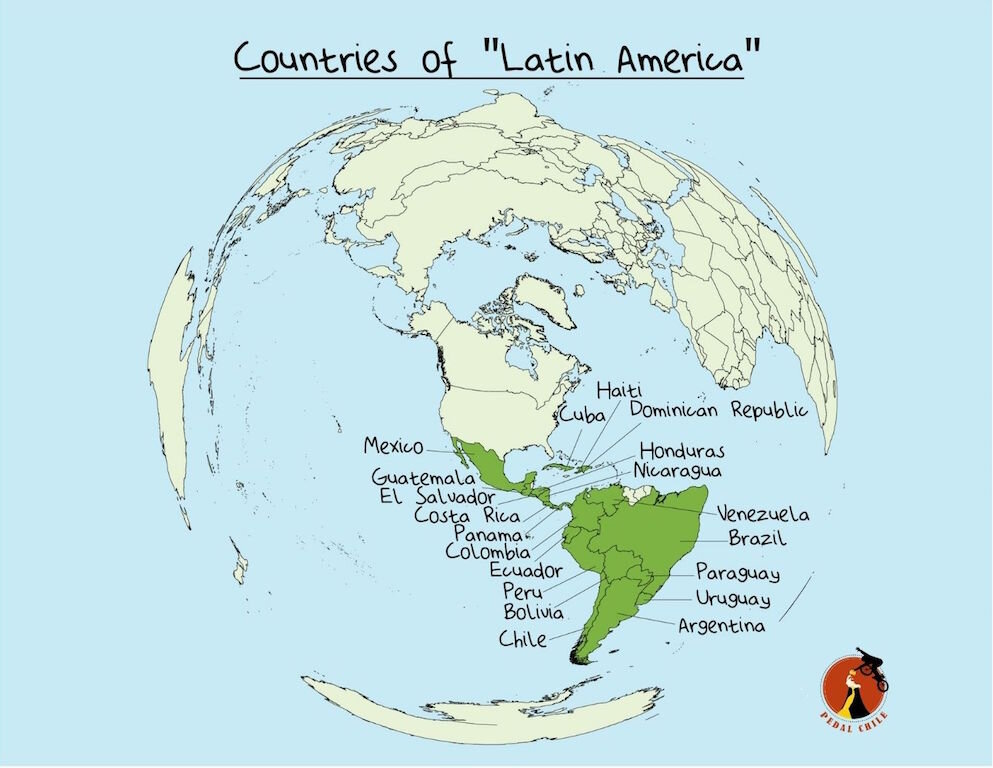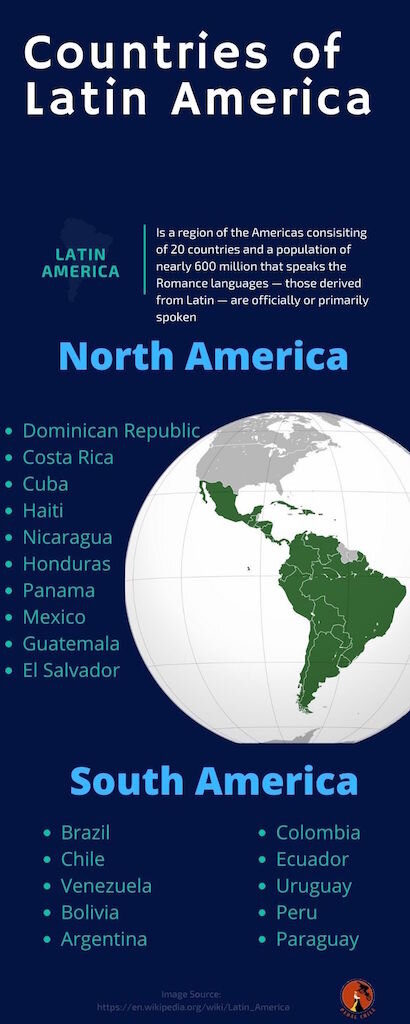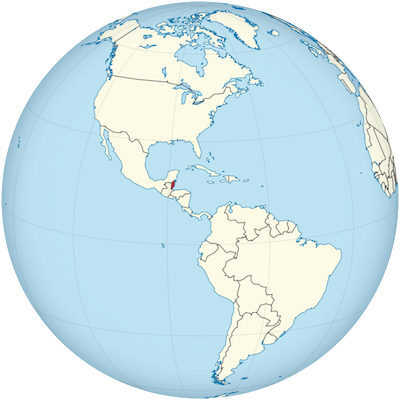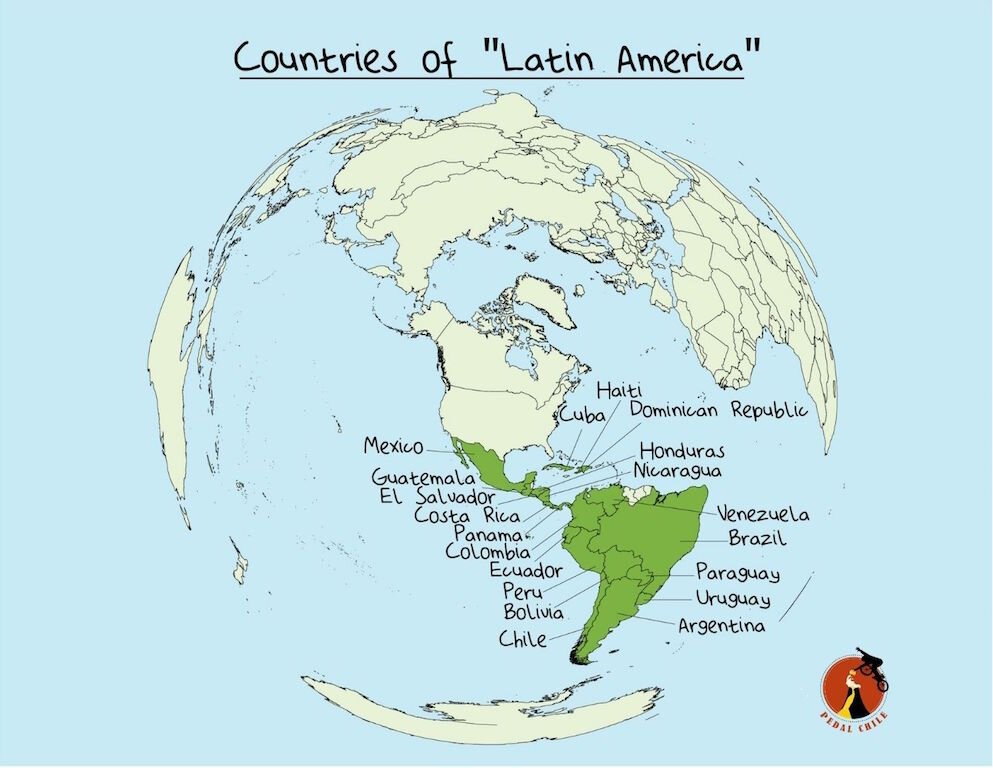Chilean Patagonia in “Latin America”
Like most other people worldwide, you may have asked yourself the following questions at least once:
Which people are Latin Americans?
Where is Latin America?
Or
3. Why are certain people referred to as Latin Americans, yet they don’t speak Latin (or do they)?
And if you are often curious like me, you must have even wondered where the term came from! If you have, then keep reading!
This article brings to you the facts about this elusive term that has been confusing nearly everyone including government agencies in the U.S and beyond for decades.
Let’s begin!
What is Latin America?
The term “Latin America” is not used consistently by geographers or geopolitical experts. However, The United Nations Latin American and Caribbean Demographic Centre (CELADE) limits its definition of Latin America to 20 countries:
The 10 Spanish-and Portuguese-speaking countries of South America
The 6 Spanish-speaking countries of Central America
Mexico
Cuba, the Dominican Republic, and Haiti in the Caribbean region
Here’s a more detailed list of the individual countries:
Latin America: Defined
Latin America has always been difficult to define to most people, and you’ll sometimes hear it being considered a geographic region that includes the whole Caribbean- that is, all the countries in the Western Hemisphere, south of the United States (regardless of the language they speak).
Other experts define it as a region in which Portuguese, Spanish or French (the Romance languages) are predominantly spoken, or as countries that have a history of Iberian (Portuguese and Spanish) colonialism.
The origin of the name “Latin America”
The romance languages (group of languages that belong to the Indo-European family of languages including:
French
Italian
Romanian
Spanish
Portuguese
Occitan
Catalan
Rhaeto-Romanic (originated from Vulgar Latin)
Vulgar Latin simply refers to a “later” or “popular” form of Latin whose style is a bit different from the original “classic” (standard) Latin.
Panama City, Panama
This means that these languages fall under the name Latin America due to this origin.
Latin America & Colonialism
Latin America, like many names in the Western Hemisphere, hails from a legacy of colonialism. As you may recall, during the 18th and 19th centuries, different countries in Europe grabbed different lands around the globe in efforts to establish their empires.
During this period, Latin America stemmed from a desire to separate countries speaking French, Spanish, and Portuguese from the ones that were speaking German, English, or other languages.
French association?
You may find it ironic that Latin America tends to be associated and identified with Spanish even though its origins are more closely tied to the French.
In the United States, the first known reference to a Latin race came from a French economist known as Michel Chevalier in the 1830s. A couple of decades later, the term appeared in writing during a Paris conference held by Francisco Bilbao, a Chilean politician.
According to many history experts, French intellectuals popularized the terms to refer to the people living in the Western Hemisphere’s former Iberian colonies. They were seeking to justify the imperial ambitions of their country (France) in the New World by highlighting that the Latin race members, including the Central Americans, Mexicans and South Americans had an “innate affinity” with the French, and that these people have been locked in a world struggle against the expansionist U.S and Great Britain.
Southern Hemisphere & The Americanos
Did the people of the Southern Hemisphere identify themselves with the Latin race?
No. Initially, they preferred the terms Americanos and America, and these terms were prevalent in the 1810-1820s when the region was waging liberation wars against Spain. As a result, “Americano” developed an anti-colonial meaning and didn’t just encompass Europeans but Africans and mixed-races.
When U.S expansionists began threatening Mexico in the 1830s, Central and South American elites adopted “Hispano-America” to distinguish themselves from the U.S societies.
In the late 1840s, the Southern Hemisphere elites began identifying themselves with the Latin race, and some of them were influenced by Francisco Bilbao who I mentioned earlier. The term was used as early as 1845- in Spanish America when the editors of a Mexican paper stressed that they were members of the Latin race. The term then became prevalent in Bolivia, and then Brazil and Argentina and elsewhere as Spanish American elites held concerns against U.S expansionism toward the Southern Hemisphere.
So, when did it become a concept?
Latin America became a global concept in 1856, during a protest against the expansion of the United States. The U.S president at the time, Franklin Pierce, made a decision to recognize a “piratical” regime that had been established by William Walker in Nicaragua.
William Walker (Image Source: Webster and Webster)
Foreign governments were shocked by this decision and immediately sparked talk of war between the European powers in the Caribbean (France, Spain, and Great Britain) and the United States on both sides of the Atlantic.
However, later on, this development eventually led governments to create what would be considered the largest anti-US alliance in the history of Latin America after intellectuals and politicians throughout the region demanded it (when they heard of the U.S President’s decision to recognize William Walker’s regime).
The transnational campaigns that resulted from the alliance caused the concept of Latin American to spread across the continent. You’d be right therefore to say that one of the first anti-US events in history led to the rise of “Latin America.”
did Napoleon coin the term “Latin America”?
Map of Latin America circa 1826 (Image Source: Bulmer-Thomas)
It always sounds amazing to hear that the man who reasserted the French influence around the world also coined the term “Latin America.” Wherever you go, it would be a rare spectacle to hear a story about the origins of Latin America without Napoleon at the center of it.
But is it true that Latin America is another one of Napoleon’s great “accomplishments?”
Or is it another historical whim that wouldn’t just leave our online history books?
Here’s the sweet-bitter truth:
Napoleon III did NOT coin the term “Latin America.”
Rather, the term was coined during his rule over France, however, the exact person is unknown. Unsurprisingly, this helped him in his campaign meant to imply a level of cultural similarity between the Latin American region (consisting of people who spoke Portuguese, French, and Spanish) and France that was aimed at assisting him to extend French imperial control over the entire region.
Who then first used the term?
A French man known as Michel Chevalier is the one who is often credited for the coinage of the term. In his writings, he postulated that a section of the Americas has a racial or cultural affinity with the romance cultures (such as Spanish, Portuguese, Italian, and French) in the 1830s. According to Chevalier, this part was inhabited by a group of people of a “Latin race” that could befriend what was at the time referred to as “Latin Europe.”
Latin American intellectuals and political leaders later took up the idea and yes, it became a thing!
Is Belize, Guyana & Jamaica part of “Latin America”?
“The expression “Latin America” whose origin is still hotly disputed, at first had little more than geographical significance - it referred to all those independent countries south of the Río Grande in which a language derived from Latin”
Some ‘experts’ consider English speaking countries to be part of Latin America.
Some ‘experts’ consider Belize, Guyana, and Jamaica to be part of Latin America. Even though the official language is English in all three of these countries and all are former British Colonies.
Textbook definitions of Latin America, include both a geographical and language component:
Geography - Part of the Americas (including the Caribbean)
Language - Speak the Romance languages (derived from Latin) that include Spanish, French, Italian, Portuguese, Catalan, Romanian and Occitan
However, some social scientists and many world organizations consider, Jamaica, Belize, and Guyana as part of Latin America, even though these 3 countries speak English and are all former British Colonies.
No definition of 'Latin America’ is accurate, without the inclusion of the complex struggles between conqueror and colonization.
What we call ‘Latin America’ today, is really nothing more than fragmented pieces of an indigenous ‘America,’ pieced together with ‘nation’ names. With this more complete definition, it’s easy to see why some geographers include these countries into the geographical area known as Latin America.
Bottom line
There are many views as to the origin of “Latin America” but one thing has always been clear. Latin America is a general term for speakers and inhabitants of the romance language-speaking regions in parts of North America and most of South America.
These people shared historical experiences of conquest by the Portuguese and Spaniards between the 15th and 18th centuries. They also shared a historic struggle to independence, and as we’ve seen, were brought together under this banner (of freedom and promotion of democracy) by their increasing concerns against U.S expansionist policies and domination. Latin America, as a racial concept exists due to the early U.S threat and the idea that the world’s main Latin power, France, would help curb this threat.
Valentina is a guide for Pedal Chile and is our resident badass. Valentina was born and raised in La Patagonia, which probably explains her affinity for adventuring. When Valentina isn’t crushing some poor dude’s soul, you can find her shredding down Rucapillán. Favorite season: Austral Summer
Sources for this article:
Bodenheimer, Rebecca. “What Is Latin America? Definition and List of Countries.” ThoughtCo, 28 July 2019, www.thoughtco.com/what-is-latin-america-4691831.
Bulmer-Thomas, Victor. The Economic History of Latin America since Independence. Cambridge Cambridge Univ. Press, 2003.
Eakin, Marshall C. A History of Latin America : Collision of Cultures. Basingstoke, Palgrave Macmillan, 2007.
Gobat, Michel. “The Invention of Latin America: A Transnational History of Anti-Imperialism, Democracy, and Race.” The American Historical Review, vol. 118, no. 5, 25 Nov. 2013, pp. 1345–1375.
Merriam-Webster. (n.d.). Latin America. In Merriam-Webster.com dictionary. From https://www.merriam-webster.com/dictionary/Latin%20America
Webster, Edward, and Israel Webster. “William Walker.” Smithsonian Institution, 1857.
Wikipedia Contributors. “Latin America.” Wikipedia, Wikimedia Foundation, 8 Mar. 2019, en.wikipedia.org/wiki/Latin_America.





















